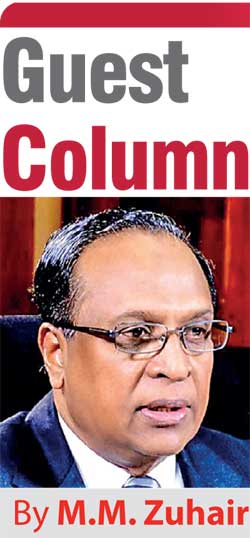Tuesday Feb 24, 2026
Tuesday Feb 24, 2026
Thursday, 23 February 2023 00:42 - - {{hitsCtrl.values.hits}}
 President Ranil Wickremesinghe has said that the $ 2.9 billion request to IMF, receivable over a period of four years, is the only ladder for Sri Lanka to come out of the deep well. The President needs to be advised that other additional options do exist for the 22 million Sri Lankans to come out of the deeply distressing well. I wish to deal here with only one such alternative option for the President to work on.
President Ranil Wickremesinghe has said that the $ 2.9 billion request to IMF, receivable over a period of four years, is the only ladder for Sri Lanka to come out of the deep well. The President needs to be advised that other additional options do exist for the 22 million Sri Lankans to come out of the deeply distressing well. I wish to deal here with only one such alternative option for the President to work on.
According to Central Bank reports, during the past 20 years, worker remittances had covered around 80% of the country’s foreign exchange deficits. Worker remittances during the six years from 2015 to 2020 had averaged more than $ 7 billion each year, substantially improving the foreign exchange liquidity in the country and in the banking system.
But in 2021 worker remittances dropped to $ 5.5 billion and in 2022 dropped further sharply to $ 3.8 billion. The country lost thereby $ 1.6 billion in 2021 compared to $ 7.1 billion earned in 2020 In 2022 we lost $ 3.3 billion compared to 2020 as well as compared with the previous six year annual average earnings.
Sri Lanka is struggling for the past one year to get $ 2.9 billion from the IMF having lost $ 1.6 billion and $ 3.3 billion, almost $ 5 billion during the past two years, with no organised efforts to restore the forex earnings, from our own countrymen and women to the established national average of $ 7 billion per year. Should not there be an appeal, at least at the president’s level, to the Sri Lankan workforce overseas to enhance direct official remittances and also to the heads of States of countries where they are employed to give preference to Sri Lankans in fresh recruitments, without passing the buck to the Central Bank or the Minister?
President Wickremesinghe knows that the IMF’s $ 2.9 billion as well as what may come thereafter from the World Bank and other lenders are repayable loans with interest. All those will add up to the national debt of $ 52 billion compelling the next generation to continue the economic struggle and for-ever be dependent on Western controlled institutions and countries. We can fall from that ladder deeper into the well. Hope not.
Indeed he and his advisors know that forex worker remittances are not repayable debts; do not involve import contents as in garment exports and stabilises the currency exchange rates in favour of Sri Lanka in terms of debt servicing and external trading.
Mr President! Restoring worker remittances to the national annual average of $ 7 billion can help Sri Lankans to come out of the ‘deep well’ faster than the IMF’s four year $ 2.9 billion.
Tapping and enhancing worker remittances can turn out to be a non-debt creating lasting solution to Sri Lanka’s crisis and to come out of the long−term hegemonic control of international money lenders. I am no economist but will those who understand the subject better respond in the national interest to the President’s challenge?